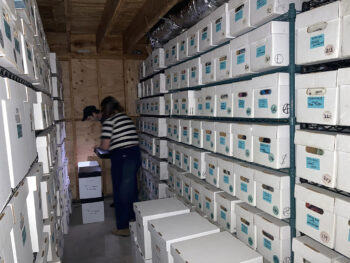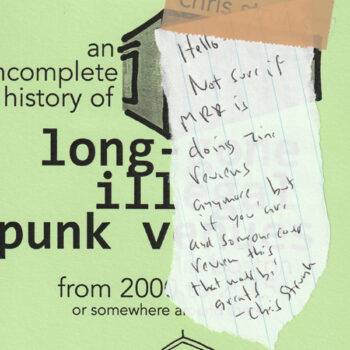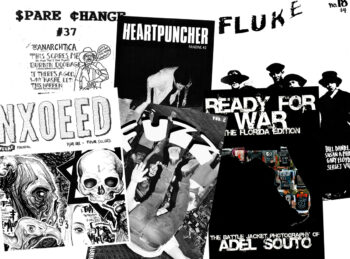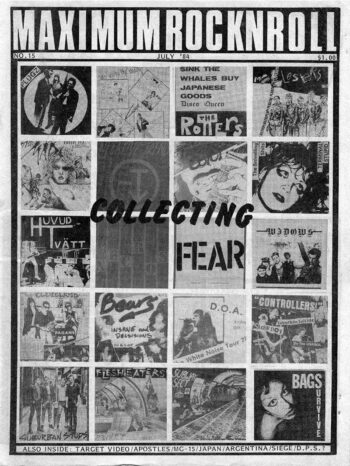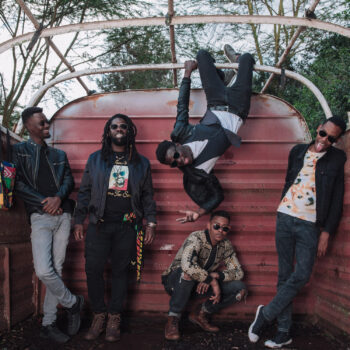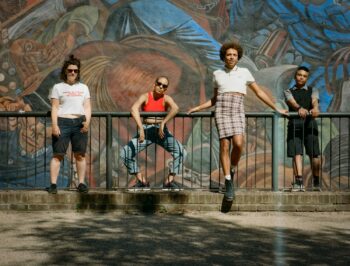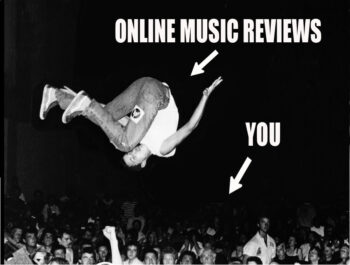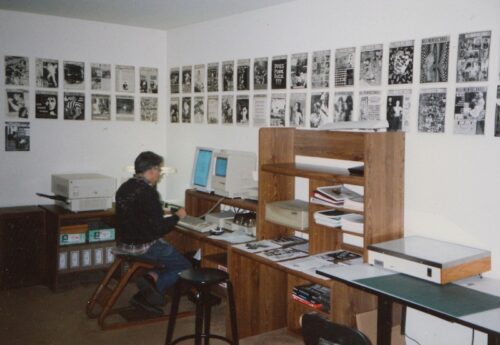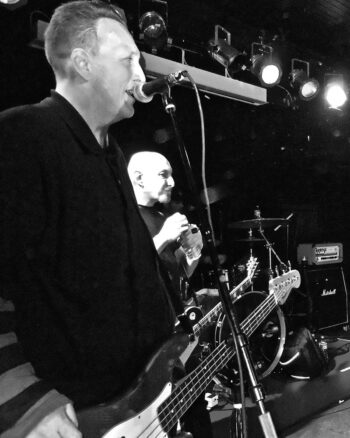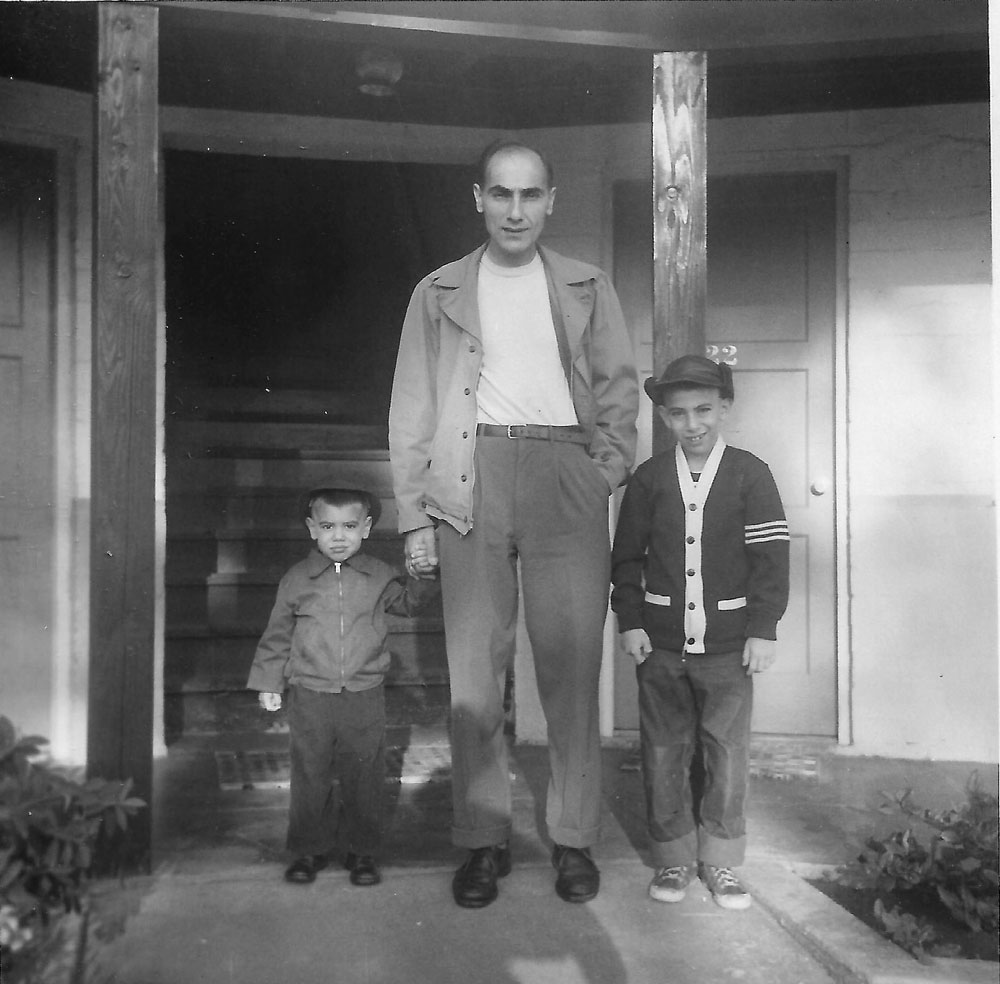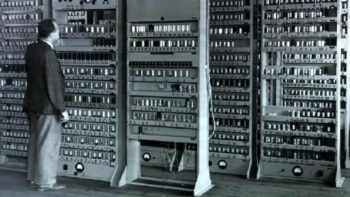See this film! From the Back of the Room
The DVD of the documentary From the Back of the Room has just been released and it looks amazing. Check out the trailer below and this interview with the filmmaker, which appeared in MRR #308 “¢ Jan ’09 (available on our Back Issues page)
Amy Oden (a.k.a KC, a.k.a kc/dc) is, among many other things, a filmmaker from Washington, DC. In 2004, she produced the documentary After the Salad Days, which took a look at the state of hardcore in DC and Maryland at the time, and spent two years traveling the US and a bit of Canada interviewing women about their experiences in punk culture for her new documentary From the Back of the Room. By day, she works as a producer and editor for MHz Networks, a non-profit TV station based in Northern Virginia, and she also had a few things to say about her thoughts on the future of media.
—Intro and interview by Dan Goetz
MRR: First, talk a bit about yourself and your background in punk and film, and perhaps when the two started intermingling.
KC: I started going to shows my sophomore year of high school. At first I was going to more indie shows, and then started gradually getting into more subgenres of punk and figuring out where my musical taste fit in the grand scheme of things. Simultaneously, I was blessed with the fact that my high school offered some media literacy classes, which I think in hindsight are really important and should be required in general for high school students, because it was really beneficial in allowing me to see the way that popular culture exploits people. I was learning these things at school and at the same time getting into these subversive styles of music, so that’s around the time my consciousness really started to expand as far as far as wanting to live outside of the dominant culture. I started getting really interested in video production around that time and since then have become more immersed in both things. It’s sort of like these weird two halves of my identity and they’ve developed independently as well as intermingling with one another. Today, I have the fortunate ability to work in a non-profit media outlet, so I don’t feel like a total corporate whore, and have gained a real level of comfort and understanding as far as DIY culture and my participation in it and my hopes for the direction that it goes in.

MRR: How has your feminism interacted with all of this? I know that one of your interests in particular in regards to feminism is Media Studies
KC: Yeah, for sure. That also goes back to when I was a sophomore in high school. One of the first books I really started getting into was We the Media, which is an anthology of different articles by really progressive media critics, and one of the articles was by a woman named Jean Kilbourne, and she writes a lot about young women being affected by the media, specifically in terms of alcohol and tobacco advertising. The things that she was writing and the images that she was talking about really opened my eyes to lots and lots of different things and that’s when I started thinking about women’s oppression as a general thing. She also made a film called Killing Us Softly, which is this intense montage of how detrimental advertisements are, which for me was pretty profound. But at any rate, these things started in my life at the same point, and through reading lots of stuff, talking to lots of people, and going to school, my sense of feminism developed, as did my sense of what I could do in the larger context of historical feminist thought and my understanding of how things are going in the feminist movement. It’s like these things—feminism, media studies, and DIY—have always been tied together for me because of my interests.
MRR: Can you connect that point in your life to how After the Salad Days came to be? Was that your first big role in taking on production work in a film?
KC: I had done some really short pieces for school at that point. I was maybe 23, and After the Salad Days was just an excuse to do some really investigative things in my local scene. It was like, “I have this project that I have to do, and what am I involved in? What do I know?” and it just came back to DC’s local hardcore scene and punk rock scene, and I was thinking about who the pillars in that specific community and that sub-genre were, and who I thought was important to talk to. That’s sort of how After the Salad Days came about, but it was a pretty major project for me and it took me six or nine months to complete. The thing about it too was that it was a class they used to offer in the school that I went to, but then they stopped offering it, and there were two girls that I went to school with, in addition to myself, that were really interested in the technical aspects of video production as opposed to “I wanna be on TV,” so the three of us lobbied to have the class recreated specifically for us. We had to get a teacher to sponsor it and do a bunch of paperwork and stuff, but we really wanted pretty badly to do in-depth production, so the three of us came together and pushed for it, and that was the only reason I was able to do it.
MRR: At that point, were you as involved with things in DC as you are now, or was that your first foray into it?
KC: I’ve been going to shows in DC for almost eleven years, and I think that I definitely knew most of the people around town, but that was the point where I kind of became visible as “oh yeah, that’s the girl with the camera,” and that was the point where those two parts of my identity started coming together and people were like, “You need a video shot? Ask KC,” and that was pretty cool for me, because it was this recognition as far as people who didn’t know that was an area of interest for me being like, “oh, we want this shot” or “hey, can you tape my band’s set.” But yeah, that was when I became visible in that respect, and then a year or two later I started setting up shows, which was sort of different, but really cool for me.
MRR: As far as the connection between After the Salad Days and From the Back of the Room, women are obviously the focus of the latter, while the interviews and footage in After the Salad Days are much more male dominated and there seems to be little musical overlap, and I’m wondering if this in particular was part of your motivation to do From the Back of the Room, or if you had the idea to do the film at the same time or even prior.
KC: I think my sense of feminism became more well rounded later for me, and I got to this point where I started being like, “Oh, punk isn’t this utopia, fuck, there’s sexism here too?” You know? And it was something I hadn’t really thought about when I was doing Salad Days, I was just like, these are the people that are really involved, and I’m just doing a factual documentation of that, and it was only after that things like sexism in punk rock or DIY really started occurring to me.
MRR: Even though at this point you had a feminist background.
KC: Yeah, but I was thinking about it in terms of dominant culture—I wasn’t applying it to that environment in my life until a little bit later, when I was maybe 24, but soon after Salad Days was completed and I left school. I was kind of like, “whoa, wait a minute,” [laughter] you know?
MRR: The film touches on a different community than the one I know you from, and you’ve talked about feeling frustrated, because you straddle sub-sects that have various opposition to each other.
KC: I think one of the things about the DC community specifically is that sometimes it feels like a small town, but it’s definitely big enough that that there’s a decent amount of separation between subgenres and the communities that go along with them. I think growing up I was definitely involved in lots of different communities, but I like that. You can talk about the street punk crowd and how it’s different from the traditional hardcore scene and how that again is different from the crust scene or even the metal scene, you know what I mean? And one of the things I always bemoaned when I was younger was how there wasn’t much interaction between those communities, or at least not as much as we see in smaller towns where everyone pools together and goes to every show regardless of what their personal preferences might be. Salad Days was very much a product of me being really involved in that particular subgenre at the time, more traditional DC style hardcore, and I actually did frame the film in this context of, “I acknowledge this is what’s going on, and here’s how more traditional DC sounds are playing out in a modern context.” I’m not totally disinterested in that at this point. I still like those records, but now I’m more interested in a lot more crust and metal and things like that, and I guess that plays out for sure in the people that I chose to interview for From the Back of the Room. I think it’s also important in this weird way to think about and talk about the fact that sexist concepts still exist in those circles because they’re the circles that position themselves as being the most progressive in underground DIY music. I think in that way, it kind of validates the idea that there’s sexism by saying, “Here are these really radical people that acknowledge and talk about these concepts all the time, but it’s still going on.”
MRR: And they can be less of an easy target, because it is subtler, and people will come up with various denials for it rather than it being out there and I think being easier to confront.
KC: Yeah, more insidious in a weird way, like you wanna talk about the sex positive crust boy who still ignores his girlfriend when they’re in a group of people and it goes unmentioned, versus the hardcore dude that’s very blatantly like, “babe, hold my jacket.”
MRR: Or who might not know all the “correct” words, but have better relationships with their female friends or girlfriends than, again, some sex positive crust boy.
KC: Exactly. It’s all about being self-educated.
MRR: So talk a bit about From the Back of the Room from conception to the point it is now. I know that’s a huge general question.
KC: Well, From the Back of the Room started about two years ago when I was on tour, and a friend of mine called me up and said, “there’s a guy who’s really upset about some things going on with women in DIY and he wants to sit down and talk with you, and I told him that you were interested in filmmaking,” so I was like, “sure, that sounds great, let’s sit down and talk.” So we sat down and talked, and he’d had an incident with a friend that, I can’t remember if she was harassed at a show, but something bad happened to her at a show as a result of being female identified, and he was really motivated to do something that he wanted to have counteract that. And at that point, since Salad Days had been done, I had come around to the idea that it was something that I thought I would do eventually, [laughter] you know what I mean? And I was like, “well, this is me proving my own existence in a way,” and I knew that it was something I wanted to do and I was like, “Well, better to start down this path with somebody else than do it by myself,” and so we started raising money around DC by doing some film screenings and some shows, DIY events and some raffles and stuff like that with local businesses. My job, miraculously, generously, told me that it was OK to use their camera equipment, and we wouldn’t have been able to do the film without that, hands down. So they loaned us a camera and we hit the road, and that April after eight months of fundraising, we went to the Midwest and we did a trip where we went to Chicago, Michigan, Wisconsin, and Minneapolis. We did about a dozen interviews in eight or ten days, came back, and hit the ground running again. We went to the West Coast that August and did the same amount—about a dozen more in eight to ten days. And then I finished most of the shooting myself after that, which entailed some trips up and down the East Coast: went to Boston, New York, Philly, DC, Baltimore, Richmond, the Carolinas, and did the last interview for the film in Philly not that long ago. So the filming is complete, and after that I took a couple of months to track down a shit ton of footage from bands, corresponding with a million people, going down a variety of really complicated paths that sometimes lead to dead ends to try to find tapes and get permission and stuff like that, footage that in some instances was recorded fifteen years ago. I have almost all the footage I need to edit right now, and I have to take a break from it, because I’m in school this semester trying to get my Master’s Degree, but I’ll really get knee deep in it once I’m done with the semester. And I’m hoping that it’s mostly finished during that period, which ought to be between six and nine months.
MRR: Any interesting or funny stories from along the way?
KC: Oh man, tons! One of the things we asked people was if they had any particularly good or bad anecdotes that they felt happened as a result of being a woman or female identified, and that brought forth a range of responses from people. You know, there’s the stereotypical story of the lady in the band being, “No, I’m actually in the band” or getting into an argument with the sound guy, but then there were also some really funny stories. I don’t know if I want to incriminate people, but one woman talks about meeting Mike Ness in the mid ’90s and how she had really liked Social Distortion and she thought they were really cool, and she was trying to interview them for something, and he was just a total pig and how it broke her heart. Stories like that were pretty funny [laughter]. Other things—interviewing Ami from Voetsek, it was cool doing that interview and having her be like, “Wow, no one’s ever explicitly asked me about being a queer mom in an interview before, or acknowledging that I’m a person of color and asking how that is for me in the punk scene.” Just situations like that were cool, people being like, “Oh wow, no one really gives a shit about this, can we talk?”
MRR: Yeah, we’re supposedly in the “post-feminist” era and yet, Ami’s in I think her forties and she’s never been asked this.
KC: Yeah, that’s crazy! I would say Voetsek’s been an important band for, how long now? Years! I mean, they’ve been to Japan for Christ’s sake. But yeah, lots of cool moments like that, and doing the film has also been really personally enriching for me, because it’s been this vehicle for me to learn about my own history in this way that I never really thought that I could, like meeting Cynthia Connolly or Kathleen Hanna or Allison Wolfe, or even ladies that are doing things today, and talking to them, and being like “Wow, this is where you’re coming from and these are the limitations that you faced or face?” and learning about how they feel about things has just been really amazing to me.
MRR: It’ll be interesting to see how the attitudes and perspectives of people like, say, Cynthia Connolly or Kathleen Hanna compare to attitudes of younger women who are active today, since they all continue to play various roles in music.
KC: I think that’s something that I tried to get at and establish a bit in the film, that there is this historical context that we shouldn’t ignore. I mean, “punk’s only been around since ’77,” but things have definitely changed in that course of time, even though it hasn’t been that long.
MRR: And I think women of any generation can go back and look at, say, Patti Smith or Joan Jett as first wave role models.
KC: Or look at Wendy O Williams.
MRR: At one point you felt more humble about After the Salad Days, as if you were bragging by even talking about it, and it sounds like the experience of doing From the Back of the Room and coming into contact with so many empowered women has changed this for you.
KC: I guess it’s difficult for me feeling this pull between wanting people to know certain things and also not wanting to be almost masturbatory in a sense, you know? But I think that’s been a little bit different with From the Back of the Room, because I feel like I want to talk about this stuff with people. I want to have these conversations, and I want dialogue to come out of these things, and that’s something that’s the ultimate hope for me with the film, and because I can’t give the film to people just yet, I want to talk about it with them. It’d kind of weird but simple in this way.
MRR: Maybe too soon to ask this, but do you have any specific plans yet for distributing the film once it’s finished or setting up screenings whether you have any time to take it on the road.
KC: I’d like to take it on the road. I’m not going to be living in DC for very much longer, but my plan is definitely to come back and have the first screening in this city because without the amazing help and support of everyone in this community, it just wouldn’t have happened. And that’s another thing that’s been really intense about making this film is just learning about how many people actually give a shit, and feeling really touched by that, so I definitely want to come back to DC and do the first screening here, and I would like to go on tour with it. I don’t know if I’ll have time, but I’ve met some really cool people in recent months—like one of the people that was involved with that bike porn documentary, and this woman who was touring on a documentary about squatting, and just meeting them and learning how, not necessarily how it was easy for them, but it’s like booking any other DIY tour and I kind of knew that, but meeting them brought that home as far as understanding that it could be done, so I think it’s just an issue of me finding the time to book it. I want to do it, and it’s easier than doing a DIY tour with a band, I can just mail people DVDs! I don’t care—I don’t need to make money off of this, I don’t want to. I just want people to see this if it came down to it and I couldn’t come down to make it out. I mean, I’d love to be at the screenings and talk to people and stuff like that, but if it comes down to it, I can always mail people DVDs to do screenings. Shit, and people can do a screening as a benefit for something they care about, benefit something important. As long as I don’t think it’s something that’s a scumbag endeavor, I’m all for it.
MRR: I wanted to ask about your day job at MHz Networks: I’m interested in hearing more about this as well as the nature of the station and non-profit TV in general. I actually wasn’t even aware of the existence of non-profit TV, other than PBS and Public Access, until I learned more about your job, and I’m curious as to what role you feel it plays. Is it available on cable or only in certain areas?
KC: We’re actually gaining affiliates right now—we’re a PBS model station, although we’re not affiliated with PBS, but we’re getting our own affiliates, which is really cool, so the station is expanding. Right now it’s available on cable in DC as well as the cities, which have explicitly signed up as affiliates, but I don’t know exactly what’s gonna happen with the digital conversion in February of ’09. I think we’ll probably just get more and more affiliates and hopefully it’ll do really well. It’s cool for me to have a job that I actually believe in, in a sense, and that it’s a nonprofit, which I think is really cool. We do a lot of education outreach, and the station’s main mission statement talks about bringing international programming to the US, so a lot of our content is internationally produced news, international movies, stuff like that. Outside of feminism, queer studies, and media literacy, one of the things that I think is more important for Americans to do is learn about places that aren’t here. It’s so valuable. Tell me about different places, different people, things that are similar to my life, things that are different. I think people need to know that kind of thing and achieve a level of respect with the world around them. It’s easy to live an isolated life in the US, because it’s such a huge country, this monolith of first world power, but I think it’s good for people to learn that there are things outside of themselves.
MRR: Another question likely asked entirely too soon, but what kinds of media projects do you want to do in the future?
KC: Oh man, this is actually a really cool thing for me, because I just started thinking about this not that long ago and I’m really amped about it. This is in this larger context of me having this belief that modern media is kind of splintering with the digital conversion and rise of the internet and stuff like that. I think that in between five and ten years, it’s gonna be even easier than it is now for people who aren’t part of “mainstream media” to have access to spread their ideas, and it’ll also be a lot easier with iPods and all kinds of stuff like that. People are wanting shorter pieces of media and it’s a “give it to me now, stat!” kind of attitude, and I didn’t think it was possible until I started thinking about the progress of media in that way, but what I want to try to do is finish my degree, incur an incredible amount of debt, establish a non-profit, try to get some grant money, and make short films about women doing really incredible things in their daily lives that I can then sell to various places. Not a week or even a day goes by that I don’t meet a woman who’s doing something really amazing. And not even just women, queer people that are raging and doing really amazing things, transgendered people who push everyone’s envelope. I think that stuff is really important to recognize, because by recognizing something, you give it visibility, and by giving visibility to people, you validate their existence.
MRR: As far as the exchange of media you were talking about, with making short films and getting them on stations, is this something that’s theoretical at this point as far as there being a means for doing it, or is that already in place? With what you’re saying about people getting more access to the mainstream media, would this be a viable thing as far as, say, non-profit stations accepting submissions, or what specifically?
KC: It’s hard to speak specifically about it, because I think that concept is gonna manifest itself in a lot of different ways. I think there are already tons of vehicles for people to get things heard online, for instance, that weren’t there even three years ago, and I think that kind of thing is going to keep proliferating, and you’ll see more and more of that. I think there’s never gonna be any shortage of people that are wanting to be heard, and as long as that’s a constant, and as long as media continues to change in the way that it’s changing today, with television and the internet getting closer and closer together, I think you’re gonna see more and more of those voices emerging.
MRR: Have you started to see your station or non-profit television gaining any major influence at this point? You mentioned getting picked up by PBS affiliates.
KC: When you talk about concepts like power and influence, I think that when media starts to break down and steer away from being this very consolidated, dangerous thing, it inherently loses some of the power associated with it, and I want to say that it can be good and bad, but I think that it’s a trade-off. You have greater accessibility and less power, or more power and less accessibility, and I think I would err on the side of accessibility. I think that’s more beneficial, because then you put trust in the user to determine what they want to look at. It’s weird right? These are new concepts that we haven’t had to really think about before [laughter].
MRR: Since this is the film issue, what films, fiction or nonfiction, would you recommend to girls or queer kids coming of age, or even guys that want to be enlightened?
KC: As far as narrative films go, I don’t have a terrible lot to say. Shortbus? The only generalization I can really make is to watch movies that are independent, because big Hollywood blockbusters are gonna get you nowhere, but I think that most people who are gonna be reading MRR are probably already aware of that. I would say watch the Tribe 8 documentary, watch Don’t Need You, the film about Riot Grrl, and Afropunk and Beyond The Screams—those are all really amazing. Watch She’s Real, Worse Than Queer, that’s a great film for people wanting to know about Tribe 8 and all the associated people that were active around the time that Tribe 8 was super popular. Check out Live Nude Girls Unite. But, yeah, anything that’s self-reflective I think is beneficial to people. Seek out anything that describes your existence, and then from there, seek out things that describe people that are more marginalized than you, because it’s important to know about them.
MRR: Anything else that you want to add?
KC: Not to sound too idealistic, but the main thing that I want for the film is for maybe one day a girl that’s fifteen or sixteen who is thinking about going to a show to see it and say to herself, “Things in this community aren’t perfect, but they’re a damn sight better than the rest of society,” and we’re trying. I think one of the things about DIY and punk rock that’s been really important to me in the last couple of years is that even though it’s still flawed, it’s the only thing in my life that I really believe is up to me—that I have the power to change and to shape and to give back to, and so I really want people to take that away from this film and have really important conversations. Yeah!

